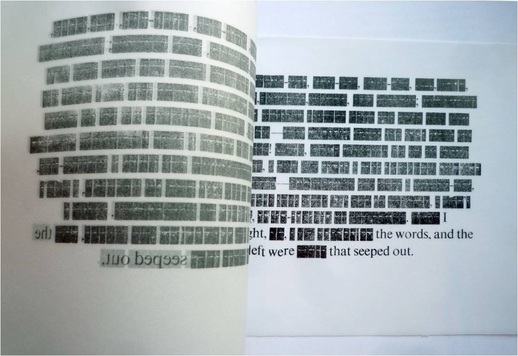"Seepage"
Seepage started from the desire to erase the words and leave the punctuation. The text to hand was a printout of Mary Ruefle's essay on erasure, and I chose the paragraph with the most punctuation. Having set it “blankly”, and having mused on its verbal content during the process, I turned instead to letting it reveal its meaning, turning over the type bit by bit and letting the words seep back in, just as the text says.
Intended as an edition of 15, it has become, through wastage due to the drying time of ink on tracing paper and the wobbliness of upside-down printing, an edition of 10, with one copy going to the author, who has given permission for use of her text .
Intended as an edition of 15, it has become, through wastage due to the drying time of ink on tracing paper and the wobbliness of upside-down printing, an edition of 10, with one copy going to the author, who has given permission for use of her text .
The Insomnia Diaries
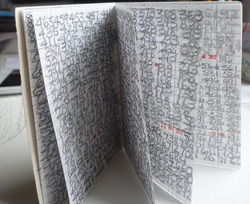
One recommended way of getting back to sleep is to count backwards in multiples - a task that takes some attention but is really quite boring. Written on ledger sheets, this is an accounting for time spent (unwillingly) awake.
A Set of Sonnets
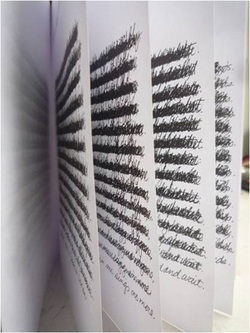
By learning the poem starting from the last line, the person recalling it should make fewer mistakes as they approach the final, most often rehearsed, lines. When the poem is written out as part of the memorization process, the final lines are most clearly discernible; the entire poem is contained in the first line, and is so compacted that it takes a feat of memory to unravel it.
List of first lines
Death be not proud, though some have called thee
Earth hath not anything to show more fair
Much have I travell’d in the realms of gold
Shall I compare thee to a summer’s day?
Since there’s no help, come let us kiss and part
The world is too much with us; late and soon
What lips my lips have kissed, and where, and why
What passing-bells for these who die as cattle?
When I consider how my light is spent
When in disgrace with Fortune and men’s eyes
List of authors
John Donne (1572 – 1631)
Michael Drayton (1563 – 1631)
John Keats (1795 – 1821)
Wilfred Owen (1893 – 1918)
Edna St Vincent Millay (1892 – 1950)
John Milton (1608 – 1674)
William Shakespeare (1564 – 1616)
William Wordsworth (1770 – 1850)
List of first lines
Death be not proud, though some have called thee
Earth hath not anything to show more fair
Much have I travell’d in the realms of gold
Shall I compare thee to a summer’s day?
Since there’s no help, come let us kiss and part
The world is too much with us; late and soon
What lips my lips have kissed, and where, and why
What passing-bells for these who die as cattle?
When I consider how my light is spent
When in disgrace with Fortune and men’s eyes
List of authors
John Donne (1572 – 1631)
Michael Drayton (1563 – 1631)
John Keats (1795 – 1821)
Wilfred Owen (1893 – 1918)
Edna St Vincent Millay (1892 – 1950)
John Milton (1608 – 1674)
William Shakespeare (1564 – 1616)
William Wordsworth (1770 – 1850)
Inky Books
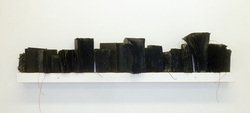
Made of newspaper and other paper dipped in or covered with different sorts of ink, these books measure 5-10 cm tall and include text or stitch.
Alphabetical Order (left) and Combing the Dictionary (right)
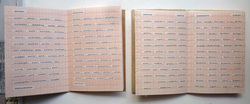
Words cut from dictionary pages and machine-stitched to graph paper, a dictionary page corresponding to a book page - but half the size.
This leaves the cut-up pages looking like a memory full of holes (which it is); the new books are fairly meaningless, as they have lost the richness of the definitions of the words and the relation to everyday reality.
This leaves the cut-up pages looking like a memory full of holes (which it is); the new books are fairly meaningless, as they have lost the richness of the definitions of the words and the relation to everyday reality.
